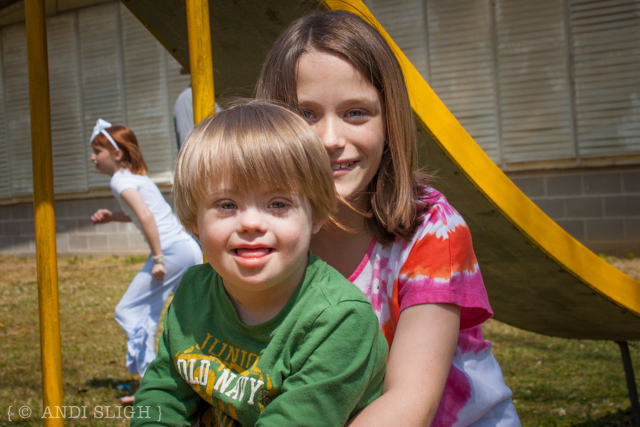Guest Post: Advice for the New Special Needs Parent

Andi Sligh is an ordinary mom living an extraordinary life on the gulf coast of Alabama with a daughter with cerebral palsy, a son with Down syndrome, an adventurous husband, a wild Westie, a rescued Schnoodle, a camera, and a worn out pair of running shoes. She blogs it all at Bringing the Sunshine, tweets a little @AndiSligh and recently published There’s Sunshine Behind the Clouds: Surviving the Early Years as a Special Needs Mom, a free ebook for parents at the beginning of their special needs journey.
Ten years ago, my daughter was born with cerebral palsy. The early years of her life were an emotional struggle, but around the time she turned four things got better.
Three years ago, I became a special needs mom for the second time when my son was born with Down syndrome. Since then, I’ve realized that those early years with my daughter prepped me in a way I could never have imagined.
In talking with other special needs moms, I’ve found that the lessons I learned are universal, and today I want to share them with you, the parent newly on the special needs pathway, in the hope it’ll make your road a little bit smoother.
1. Stop reading the books.
 Those books you read on child development that you bought or were given before your child was born? Ditch them. They’re made for the masses, and will only serve as a reminder of what might have been. The books you bought about your child’s condition? You can keep them, but put them on a high shelf for the day you might need them for reference. Those books don’t take into account your child’s unique talents and personality, and you don’t need a reminder of all the ways your child is different or all of the possible negative scenarios that could develop as a result of his condition.
Those books you read on child development that you bought or were given before your child was born? Ditch them. They’re made for the masses, and will only serve as a reminder of what might have been. The books you bought about your child’s condition? You can keep them, but put them on a high shelf for the day you might need them for reference. Those books don’t take into account your child’s unique talents and personality, and you don’t need a reminder of all the ways your child is different or all of the possible negative scenarios that could develop as a result of his condition.
2. Replace your dreams with new ones.
Before your child was born, you had dreams for him or her. Some of those dreams were small, like the highlight reel of first words played in your head, and others were big, like becoming a doctor or concert violinist. Even without the diagnosis, your child probably wouldn’t have done the big things exactly the way you imagined them, if at all, because he’s his own person with his own interests. The small dreams may take a lot longer, if they happen at all. But don’t stop dreaming, because every hard-won achievement is going to be worth celebrating.
3. Accept that some people won’t get it.
 Many people are uncomfortable with disability. Some friends will drift away because they won’t know how to be your friend; some family members will live in denial for a while, assuming your child will “grow out of it”. Some loved ones may reject your child outright for unknown reasons. Children with special needs are a crucible for relationships. The good news, though, is your child will help you to see who your true friends are and you’ll make new friends you would never have known without your child’s condition opening the door to them.
Many people are uncomfortable with disability. Some friends will drift away because they won’t know how to be your friend; some family members will live in denial for a while, assuming your child will “grow out of it”. Some loved ones may reject your child outright for unknown reasons. Children with special needs are a crucible for relationships. The good news, though, is your child will help you to see who your true friends are and you’ll make new friends you would never have known without your child’s condition opening the door to them.
4. Let your child be who he is.
I’ve spent more hours than I can count with therapists, and the one thing I always felt when we left them was guilt that I wasn’t doing enough at home or we weren’t going to therapy enough. What I realized eventually, though, is no matter how much therapy we did, it would never have been enough. Do as much you can, as often as you can, but don’t beat yourself up if you need to take a break. Remember that therapy is a way to help your child reach his full potential, not fix or change him.
5. Hang in there, because it does get better.
 The early years, up to about age four, are tough because child development is so rapid and the disparity between your child and typical children his age is clear. Those early years are also when you’ll search (in vain) for answers about what your child’s future will look like. It’ll be a perfect storm for a while. But one day you’ll realize that all of those other kids are just growing, not developing new skills, while your child continues at his slow pace, and the weight will be lifted. You’ll also have a clearer picture of what your child’s reality is, and you’ll be glad the doctors never limited your expectations.
The early years, up to about age four, are tough because child development is so rapid and the disparity between your child and typical children his age is clear. Those early years are also when you’ll search (in vain) for answers about what your child’s future will look like. It’ll be a perfect storm for a while. But one day you’ll realize that all of those other kids are just growing, not developing new skills, while your child continues at his slow pace, and the weight will be lifted. You’ll also have a clearer picture of what your child’s reality is, and you’ll be glad the doctors never limited your expectations.
6. Enjoy him while he’s still small.
 Those first few years will be a whirlwind of doctor’s visits, therapy appointments, and medical bills, and it’s tempting to power your way through them. Don’t miss out on the magic moments. Have fun with your child. He won’t remember those early years, but you will. Take the time to enjoy his unique gifts and personality while he’s young.
Those first few years will be a whirlwind of doctor’s visits, therapy appointments, and medical bills, and it’s tempting to power your way through them. Don’t miss out on the magic moments. Have fun with your child. He won’t remember those early years, but you will. Take the time to enjoy his unique gifts and personality while he’s young.
—————————————————————————————————————-
Thanks so much to Andi for sharing her advice. If you would like to be a guest on the PHS blog or have a topic you would like to see addressed, please e-mail Kelsey at kkhalena@pediatrichomeservice.com.


